The UCLA Department of Information Studies (IS Dept) is setting the intellectual agenda for the information professions and disciplines. Its faculty members are internationally renowned scholars and teachers, conducting research at the forefront of their fields. Graduates of its programs are making the world a better place by improving the ways in which information is preserved, accessed, and used.
The IS Lab assumes a significant role in collecting library materials sufficient to meet information needs on topics relating to the instructional and research mission of the Department of Information Studies within budgetary and space constraints. The collection provides resources to the entire community, though its primary users are faculty, students, and staff within the IS Dept.
Academic Departments Served
The IS Lab collection primarily serves the instructional and research needs of the faculty, staff, and students in the Department of Information Studies. The collection also serves various arts, humanities, and social sciences departments on campus, including Anthropology, Education, Film and Television, Linguistics, and any other departments for which consideration of information classification, format, and preservation may be of value. Additionally, anyone on campus who wants to analyze, contextualize, or investigate information artifacts, records, or practices may seek resources and assistance in the IS Lab.
Programs in the Department of Information Studies support the critical examination of information in all its formats and cultural, economic, and social contexts throughout the world by combining hands-on practical experience with academic study. The department offers courses for undergraduate and graduate students, with a multidisciplinary, cross-cultural approach to scholarship in five areas of specialization. Degrees offered include the Master of Library & Information Science (M.L.I.S.) and the Doctor of Philosophy (Ph.D.). The department serves undergraduate students through introductory courses on aspects of information studies. In addition, the Department of Information Studies offers non-degree programs, including the California Rare Book School, the Senior Fellows Program, and the Post Master’s Certificate of Specialization in Information Studies.
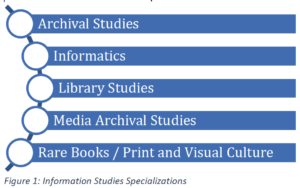 These programs of study are designed to develop information professionals and scholars in each of the five areas of specialization. The professional faculty comprise information professionals from area archives, libraries, media companies, and preservation organizations who are innovators in their fields. The academic faculty are leaders in in their respective disciplines, who publish regularly in top journals and advance the field through rigorous research. Graduates of the programs offered by the Department of Information Studies include highly respected scholars and professionals, including: 21st Century Fox, Academy of Motion Picture Arts and Sciences, American Honda Motor Company, Disney, EBSCO, Getty Research Institute, Library of Congress, Los Angeles Public Library, NBC, Nickelodeon, Paramount, RAND Corporation, Sony Pictures, and top iSchools across the globe.
These programs of study are designed to develop information professionals and scholars in each of the five areas of specialization. The professional faculty comprise information professionals from area archives, libraries, media companies, and preservation organizations who are innovators in their fields. The academic faculty are leaders in in their respective disciplines, who publish regularly in top journals and advance the field through rigorous research. Graduates of the programs offered by the Department of Information Studies include highly respected scholars and professionals, including: 21st Century Fox, Academy of Motion Picture Arts and Sciences, American Honda Motor Company, Disney, EBSCO, Getty Research Institute, Library of Congress, Los Angeles Public Library, NBC, Nickelodeon, Paramount, RAND Corporation, Sony Pictures, and top iSchools across the globe.
Enrollment & Graduation Trends
| Program
|
Students Enrolled 2017-2018 |
Students Graduated 2017-2018 |
Students Enrolled 2018-2019 |
Students Graduated 2018-2019 |
| MLIS | 105.5 | 45 | 110.5 | 52 |
| PhD | 26 | 4 | 24 | 6 |
| Post-Master’s Certificate of Specialization in Information Studies | 1 | 0 |
Instructional Trends
| Instructor Type | 2018-2019 | 2019-2020 |
| Ladder Faculty | 13.5 | 13.5 |
| Professional Faculty | 5 | 5 |
| Post-Doctoral Fellows | 2 | 2 |
Topic Trends
| Areas on the Ascent | Areas on the Descent |
| Automatic translation
Bio-based data protection Civic engagement initiatives Climate accountability Climate change & technology Collection from traditionally under-represented groups Community archives Community-based archiving Community voice in exhibition & cataloging practices Critical data studies, algorithms & social justice Critical/adversarial design Cross-cultural comparative ontology studies Cybersecurity Data archiving, management, & skills Deaccessioning, managed growth, & careful collecting Digital asset management Digital humanities initiatives, including development of video-annotation, speech-to-text-transcription,& audio-analysis tools designed enhance research capabilities within & across increasingly large datasets Digital labor Indigenous texts & recordkeeping Digital methods Digital technologies that require formatting for different platforms Disaster preparedness for collections Energy saving and sustainability in storage environments Ethnobibliography Forensic techniques in examining analog & digital collections Formerly overlooked modes of media production, such as home movies & personal recordings Global approaches to book history & literacy Hands-on experience in media archiving & preservation Historical big data extraction & analysis History of computing “Human-centered data science” Information quality, disinformation, & weaponization of social media & the internet Information & media literacy (historical & contemporary) Information policy Internet of things Instruction using primary sources Instructional technology Intellectual property & scholarly communication Large-scale text analysis Library design (interior & exterior) & accessibility Lifelong learning, including via all types of libraries & other institutions & organizations Linked open data Loss of skills working with analogue technologies Makerspaces Media archiving & preservation within the broader LIS professions Metadata, ontologies, knowledge management, & stewardship Moving image archiving Network analysis New approaches & services for homeless patrons Non-standard classification & emergent processing approaches in classification & ontologies Online instruction Open access & use Open educational resources (OERs) Preservation of web-based media & all manner of social media Privacy & confidentiality, especially regarding data Race & the internet Rights, use, & policy relating to bio-based records, archives, & migration Social media & ethics Software & race Sound preservation “Surveillance capitalism,” “platform capitalism,” & regulating the economic power of technology platforms User experience Video games “We need diverse books” movement
|
Analogue technologies
Behavioral effects of social media & “Web 2.0” as the principal focus of Internet studies “Big data” Blogging, web design Book History—less emphasis on the western tradition. Classification—belief in standards as an enforceable and/or pragmatic solution to “difference” should diminish. Digital Methods—the “boom” mentality should subside Information-seeking behavior Library-specific skills Rare Books—the appearance of elitism should begin to fade Rebinding special collections works Reference services |
The faculty participate in a variety of UCLA Centers and Programs. For example, as digital technologies spread to every continent of the world, we study their implications on education, politics, labor, identity, and economy. The Center for Global Digital Cultures is a research center bringing together top scholars across the University of California system, across the engineering, humanities, and social science disciplines. Recognizing that technologies and societies mutually shape one another, our center pioneers innovative interdisciplinary research and advocates for best practices by which we can best understand how technologies can truly support diverse cultures and societies worldwide.
The Center for Information as Evidence serves as an interdisciplinary forum addressing the ways in which information objects and systems are created, used, and preserved as legal, administrative, scientific, social, cultural and historical evidence. CIE is committed to incorporating perspectives from ethnic communities from around the world in order to sustain the diversity within indigenous cultural heritages and broaden methods of information analysis and conservation.
The Center for Knowledge Infrastructures conducts research on scientific data practices and policy, scholarly communication, and socio-technical systems. They also mentor students, post-doctoral fellows, and visiting scholars in these areas. Their latest project, funded by the Alfred P. Sloan Foundation, is studying data practices, policy, and infrastructure of multiple distributed scientific collaborations, exploring methods of data collection and management, innovations in scaling and workflows, and multidisciplinary approaches to complex problems.
The department is interested particularly in discovering and exploiting new methods for thinking critically and academically about information. Our interdisciplinary discipline brings together historical, theoretical, and cultural viewpoints in the study of information, using sources of criticism outside of the discipline.
The IS Lab’s Collections
Books & Serials
This policy covers textual works (books and serials) acquired by the IS Lab.
The Research Library Group and the Association of Research Libraries have developed a numeric coding system used to identify collection strength.
Based on the state of the collection at the beginning of 2018, the level appropriate for the IS Lab’s collections is 3, Study or Instructional Support. As such, other UCLA libraries also provide important instructional and research support to IS Department faculty, students, and staff.
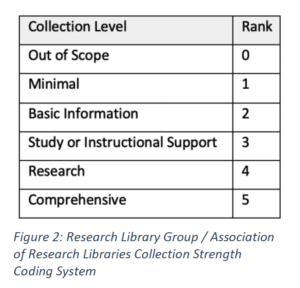
Subjects covered in current holdings fall into four broad information-related categories. Note that these topics are not necessarily nor easily correlated with the five specializations described previously. Recent initiatives that provide data to inform collection development include the syllabus project and instructor surveys. The 2018 collection is depicted in this figure. As research becomes a focal point of the IS Lab, additional topic coverage will be added.A more direct mapping from specialization to holdings in the IS Lab collections will be initiated following the PPC’s planned specialization assessment in 2020.
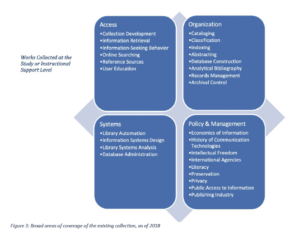
IS Lab Holdings by Library of Congress Subject Heading, 2020
| LCSH | Topic | Count |
| AE | Encyclopedias | 61 |
| AM | Museums Collectors & Collecting |
17 |
| AZ | History of Scholarship & Learning Humanities |
4 |
| B | Philosophy (General) | 7 |
| BC | Logic | 1 |
| BD | Speculative Philosophy | 5 |
| BE | American Philosophy | 0 |
| BF | Psychology | 19 |
| BS | The Bible | 2 |
| CB | History of Civilization | 5 |
| CD | Diplomatics Archives Seals |
102 |
| CN | Inscriptions Epigraphy |
1 |
| CS | Genealogy | 3 |
| D | History (General) | 10 |
| DA | History of Great Britain | 28 |
| DC | History of France – Andorra – Monaco | 1 |
| DS | History of Asia | 7 |
| E | African Americans—Bibliography African Americans—Dictionaries |
60 |
| F | History of the Americas | 10 |
| G | Geography (General) Atlases Maps |
22 |
| GA | Mathematical Geography Cartography |
2 |
| GN | Anthropology | 4 |
| GR | Folklore | 4 |
| GV | Recreation Leisure |
4 |
| H | Social Sciences (General) | 8 |
| HA | Statistics | 3 |
| HC | Economic History & Conditions | 8 |
| HD | Industries Land Use Labor |
32 |
| HE | Transportation & Communications | 6 |
| HF | Commerce | 22 |
| HG | Finance | 2 |
| HM | Sociology (General) | 27 |
| HN | Social History & Conditions Social Problems Social Reform |
1 |
| HQ | The Family Marriage Women |
14 |
| HV | Social Pathology Social & Public Welfare Criminology |
12 |
| KF | Law of the United States | 38 |
| JA | Political Science (General) | 1 |
| JC | Political Theory | 18 |
| JK | Political Institutions & Public Administration (United States) | 8 |
| LA | History of Education | 2 |
| LB | Theory & Practice of Education | 11 |
| LC | Special Aspects of Education | 7 |
| LD | Individual Institutions – United States | 2 |
| ML | Literature on Music | 3 |
| N | Visual Arts | 13 |
| NC | Drawing Design Illustration |
21 |
| ND | Painting | 29 |
| NE | Print Media | 23 |
| NK | Decorative Arts | 8 |
| NX | Arts in General | 1 |
| P | Philology Linguistics |
32 |
| PA | Greek Language & Literature Latin Language & Literature |
3 |
| PE | English Language | 153 |
| PF | West Germanic Languages | 2 |
| PG | Slavic Languages Baltic Languages Albanian Languages |
4 |
| PL | Languages & Literatures of Eastern Asia, Africa, Oceania | 2 |
| PN | Literature (General) / Film | 205 |
| PQ | French Literature – Italian Literature – Spanish Literature – Portuguese Literature | 4 |
| PR | English Literature | 66 |
| PS | American Literature | 42 |
| PZ | Fiction & Juvenile Belles Lettres | 4 |
| Q | Science (General) | 55 |
| QA | Mathematics Science & Technology |
102 |
| QC | Physics | 6 |
| QD | Chemistry | 1 |
| QH | Natural History – Biology | 3 |
| QK | Botany | 3 |
| QM | Human Anatomy | 1 |
| QR | Microbiology | 1 |
| R | Medicine (General) | 8 |
| RA | Public Aspects of Medicine | 3 |
| RC | Internal Medicine | 3 |
| RS | Pharmacy & Materia Medica | 3 |
| SK | Hunting Sports | 1 |
| T | Information Technology—Social Aspects | 35 |
| TA | Engineering (General)
Civil Engineering |
3 |
| TC | Hydraulic Engineering Ocean Engineering |
1 |
| TH | Building Construction | 4 |
| TJ | Mechanical Engineering & Machinery | 1 |
| TK | Electrical Engineering Electronics Nuclear Engineering |
44 |
| TP | Chemical Technology | 4 |
| TR | Photography | 47 |
| TS | Manufactures | 29 |
| Z | Book industries and trade Cataloging General bibliography History of books and bookmaking Libraries Manuscripts, Paleography National bibliography Subject bibliography |
633 1 676 27 3314 35 332 175 |
| ZA | Information Resources (General) | 50 |
For a visualization of this collection analysis, see https://public.tableau.com/views/ISLabCollectionAnalysis/Sheet1?:display_count=y&publish=yes&:origin=viz_share_link
Languages, Geographical Areas, Chronological Periods, Place(s) of Publication, Formats
English is the primary language for materials in the IS Lab Collections. However, the Children’s Collection includes a significant proportion of books in Spanish. Non-European languages are collected very selectively and are sent to the East Asian Library or YRL (for Arabic, Hebrew, Hindi, etc.). Geographical regions, chronological periods, and places of publication have little bearing on selection.
Textual monographs, monographic series, facsimiles of textual material, reprints, conference proceedings, journals, and electronic texts and databases are among the formats included in the IS Lab’s selection criteria. Most textbooks, elementary educational material, consumable instructional workbooks, and mass-market materials geared for the commercial market are excluded from selection, unless requested as source material for specific research or coursework.
Balance between Monographs & Serials, Print & Online
The IS Lab’s Collections are fairly evenly balanced between monograph and journal literature. As part of our holdings assessment, use of materials in the IS Lab Collections is being monitored to inform future acquisitions decisions. The IS Lab subscribes to all major relevant journals, in print and/or online. We anticipate a shift toward more online journal subscriptions over time, depending on use of the existing print serials. Retention of print versions of journals has been comprehensive. Print journals predating 2010 are held in SRLF. See Appendixes A and B for lists of currently licensed digital subscriptions.
Electronic Resources & Digitization
The IS Lab maintains partial-text, full-text, or link-to-full-text subscriptions from most of the major journal databases and indexes in the field of Information Studies. Withdrawal of physical holdings is contingent on perpetual access to digital files, along with textual and pictorial collateral material. The IS Lab’s static allocated funding has not kept up with increased costs of material, including the introduction of new online resources.
The IS Lab will participate in digitization projects for monographs and serials as opportunities arise. There are three current projects dealing with records that would be more accessible to more interested stakeholders were they available online. The IS Lab will pursue grants to support the acquisition of a rapid scanner and other necessary equipment to facilitate the digitization of these records.
Special Collections
Antiquarian and rare monograph collections for information studies, and some historical serials, are housed in the IS Lab’s Special Collections. The director works with faculty and staff to identify potential antiquarian acquisitions, assisting in the assessment and physical acquisition of archival collections, and sending materials from the general stacks that are deemed appropriate for the security of a special collections department.
Holdings of seminal works in information studies comprise our main collection, while a recently enhanced Children’s Collection and new Special Collection focusing on the history and legacy of the Department of Information Studies round out our print holdings. In addition, selective historical faculty papers will be accessioned into the IS Lab’s Special Collection.
Audio-Visual Recordings & Equipment
The IS Lab is home to a growing collection of audio, film, and video equipment and media used to train students in best practices for preservation and transfer to digital format. Refer to Appendix C for key equipment acquired and maintained by the IS Lab.
Free Resources
Some materials added to the collection are received as part of an institutional association membership. However, truly free material is added to the collection extremely rarely and selectively. Links to a handful of free digital resources appear on the IS Lab Online Resources pages. Those that are added are from substantial academic or open source sites.
Acceptance of Gifts (also see Policy on Donations)
Due to space constraints for backlog storage and in the stacks, gifts of monographs and serials are accepted extremely selectively (e.g. to receive antiquarian material or develop a relationship with a specific donor who may be a resource for monetary gifts related to renovating our facility). We have implemented a process by which collections from professors emeriti are evaluated and accessioned. The IS Lab does not accept back issues of journals currently in print as gifts. The IS Lab may accept back issues of journals if they are particularly rare, or the set is close to 99% complete.
The director must have a clear sense that the majority of titles offered conform to collection scope and are not duplicates. We are faced with several instances in which development efforts require the accession of collections that exceed our capacity. Adherence to this Collection Development Policy should aid in the marshalling of development-initiated collection donations.
The IS Lab refers potential donors of monographs and artifacts having archival value in the area of information studies to UCLA Library Special Collections.
Endowments, Intra-Library Cooperation, & Cooperative Collection Development
No endowed funds support the building of the IS Lab Collection. Therefore, we intend to leverage partnerships with other UC or Los Angeles area libraries to enhance the quality of our acquisitions. We intend to propose agreements with other UC libraries and departments to maintain subscriptions to journal titles, as the Music Library has done with the UC Music Librarians Serials Agreement. The director attends monthly UCLA Library Collections Council meetings to stay abreast of best practices and current activities relevant to collection development.
The highest priorities for the use of any gift endowment funds that may be directed toward collection development are books and media archival preservation equipment. We do not have funds earmarked in support of IS Lab expansion at this time.
Currently, the IS Lab’s collections are non-circulating, but the bulk of our holdings were barcoded in 2019, to prepare for integration with the UCLA Library catalog by the end of the 2020-2021 academic year. We have developed a temporary catalog as an interim solution in anticipation of the UC-system-wide migration to a library management system (LMS) to replace Voyager. Our barcodes are part of the UC series, which allows for integration when the new LMS is selected and implemented. Over the next two years, we must decide whether we aim to make our general collection accessible to other libraries in the system via ILL.
Weeding, Deselection, & Replacement
In 2018, the IS Lab secured an SRLF allocation to reduce the shelf space occupied by serials published prior to 2010. No weeding occurred during the 2018-2019 holdings assessment and cataloging project. Now that this project has concluded, we are preparing to weed the IS Lab’s main collection to make way for new acquisitions identified as part of our syllabus analysis project. In this project, we created a database of all the readings required by instructors as listed in their syllabi and via CCLE. After soliciting feedback from faculty, we created an acquisitions list designed to ensure that all readings assigned in IS courses may be accessed in the IS Lab. Benefits of this approach include reduced costs to students, collection currency, and increased relevance of the IS Lab’s offerings to IS curricula.
In Winter 2019, we will conduct a weeding of the main holdings, ensuring that a persistent copy of every item is held at either SRLF or NRLF. Duplicates will be offered for sale to the IS community. Finally, on socialization of this collection development policy, a data-driven analysis of gaps in, relevance, and use of our holdings will inform future weeding and deselection decisions.
The IS Lab attempts to purchase replacements for all essential materials that are damaged or become unusable. Replacements of identical material are purchased when possible. If reissues are not available, other titles may or may not be purchased depending on the availability in the collection of other editions or versions of the title(s) in question.
Specific Problems & Issues of the Collection
Shelving, Preservation, & Conservation Issues
Currently the IS Lab has no preservation policy to guide the preservation of old or brittle material that needs to be retained. This policy will be developed with input from the Instructional Services Committee in the 2020-2021 academic year. We plan to hold a book repair workshop, during which we may address some vulnerable materials.
Although not necessarily a formal part of a collection development policy, a range of processing issues, constraints, and challenges can affect how collections are built and maintained. To acquire and catalog printed material related to the curriculum requires an adequate knowledge of the field and its applicability across the five specializations of the MLIS program. Technical services functions for audio-visual materials cannot be assigned temporarily to untrained staff, yet it is often necessary for staff to assist faculty in course demonstrations and to implement immediate repairs.
BJ Ethics
BT Information Theory
HB Economic Theory, Demography
HT Communities, Classes, Races
K1401-1578 Intellectual Property
K1700-1973 Social Legislation
K3700-3705 Control of Social Activities
LT Textbooks (as information format; research on textbooks & educational information)
P87-96 Communication, Mass Media
P99-99.4 Semiotics, Signs & Symbols
P302-302.87 Discourse Analysis
QA71-90 Mathematics, Instruments & Machines, Calculating Machines, Electronic Computers, Computer Science, Computer Software
TL Motor Vehicles, Aeronautics, Astronautics
Appendix A: 2019 Periodical Subscriptions
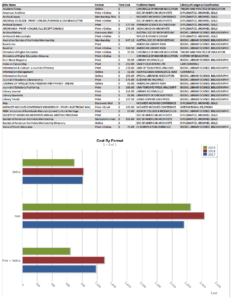
Appendix B: 2020 Periodical Subscriptions
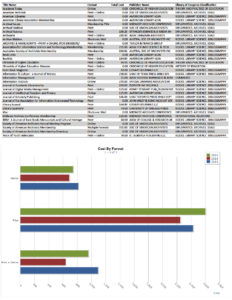
Appendix C: Key Audio-Visual Equipment
To be added Summer 2020
Appendix D: Relevant Policies

